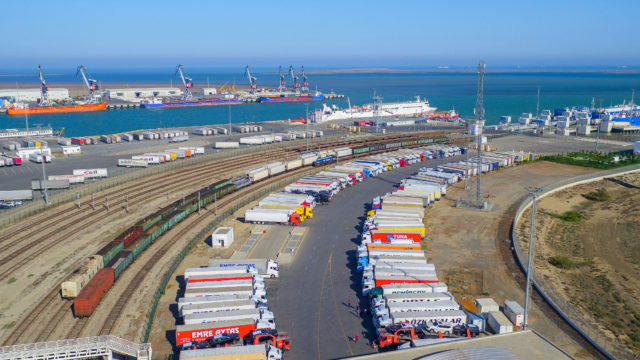The transit time along the Trans-Caspian International Transport Route (TITR), also known as the Middle Corridor, was reduced from 38-53 days to 18–23 days. It is planned to reduce this period to 14–18 days in 2024, including within the territory of Kazakhstan – from 6 to 5 days.
Report informs via Kazakh media that the volume of cargo transportation along the Trans-Caspian International Transport Route (TITR), also known as the Middle Corridor, surged by 88% in the first nine months of 2023, reaching 2 million tons.
In the first nine months of 2022, the figure stood at 1.1 million tons. The volume of cargo transportation along the route increased by 2.5 times to 1.5 million tons in 2022.
It is noted that the corridor has emerged as a significant alternative to existing routes. Its total throughput capacity is 5.8 million tons of cargo annually.
The volume of container traffic was 33,000 twenty-foot equivalent (TEU) containers in 2022, while the current potential of the Middle Corridor is 80,000 TEU containers.
Kazakhstan’s strategic goal is to increase the capacity of the Middle Corridor up to 10 million tons by 2030. To facilitate that effort, the country signed roadmaps with Azerbaijan, Georgia, and Türkiye to address bottlenecks and develop the Middle Corridor by 2027.
Kazakhstan Temir Zholy (KTZ) national railway company, Georgian Railway and Azerbaijan Railways inked an agreement to create a joint venture to develop multimodal service on the TITR on October 26 in Tbilisi. A new company named Middle Corridor Multimodal was registered at the Astana International Financial Centre in November.
The company will provide services on a one-stop-shop basis, guarantee delivery times, and pursue a coordinated policy for developing multimodal service on the China – Europe/Türkiye – China route.
Efforts are ongoing to engage European transport and logistics companies. During the visit of German President Frank-Walter Steinmeier to Astana in June, the German company Rhenus and KTZ signed a memorandum of understanding for joint work to increase cargo flow on TITR.
The document envisions cooperation in developing logistics centers, and increasing the terminal capacities of the ports of Aktau and Kuryk.
In June, the Lithuanian company LTG Cargo joined the TITR International Association, opening new opportunities for diversifying cargo flows from Kazakhstan to Lithuania and vice versa.
Negotiations are underway between the Kazakh Ministry of Transport and Austria’s Rail Cargo Group for the company to join the TITR association and open a representative office in Kazakhstan.






